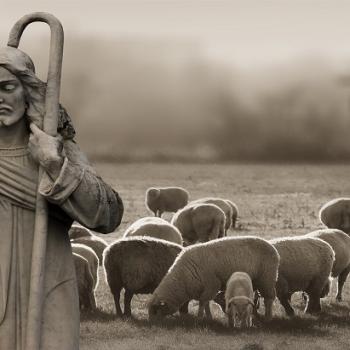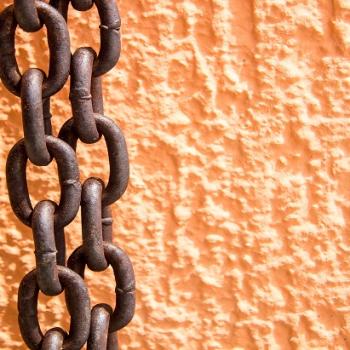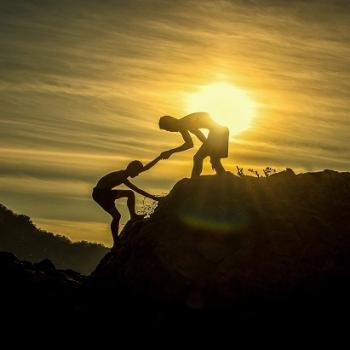We LGBTQ+ Christians constantly face a ridiculous amount of pressure from all ends. Some religious groups single us out by demanding that we conform to their idea of acceptable sexuality, or practice self-denial.
Many of my fellow LGBTQ+ Christians were coerced to go through some form of conversion/ex-gay therapy because of the tightly held belief that even having “gay thoughts” is a sin. Even when the person struggling with their identity is a child, that isn’t enough to stop some Christians from demanding that they change to fit their ideal paradigm. It’s exhausting having to deal with these unfair expectations that can lead to us questioning the validity of our relationship with God.
For this article, much of my research was kicked off by watching this following YouTube video by God is Grey, my favorite Christian YouTube channel. Brenda Davies (author of the channel) created this eye-opening video about a talk between two LGBTQ+ Christians with respectfully opposing views.
This video by Brenda first told me about the fantastic Jackie Hill Perry, who has done an excellent job conveying her views on the intersectionality of sexuality and faith.
Thanks to Brenda’s video, I found this next one, which encapsulates the talk between Grace and Jackie.
Gay Conversations
Just from the first 2 minutes alone, Grace’s video is another aggravating reminder that not all “sins” are treated equally in the eyes of some Christians. It seems that obsession over gay stuff is timeless. How disappointing.
However, isn’t it fascinating how diplomatic Grace is here in the face of these anti-gay protestors? I can’t say that I’d be able to remain calm in the face of another Christian telling me that “tough love” is equivalent to obsessively telling LBGTQ+ folk that they’re Hellbound while refusing to give other groups this cruel treatment.
“During the parade, the PFLAG group marched by and they were holding signs that said ‘I love my lesbian daughter’ or ‘I love my gay son’. And I just…I wanted that so much. And not just from family or from friends, but I wanted to love myself that way.”
Part of me wishes that I hadn’t finished the video because of the hard conversations Grace heard here. This is a quote from Leea, a non-binary gay Christian who Grace got to speak with:
“She came in the room and shook me and was like, ‘You’re not gay!’ And she was crying over me and you know, telling the demon to come out. And ‘I wish you were dead, rather than be gay.'”
I love that at the end of this video, Jackie tells Grace that both opposing sides of LGBTQ+ Christians need to be friends. I wholeheartedly agree.
Grace and Jackie
Grace’s conversation with Jackie is full of diplomacy on both sides. When Grace asks Jackie about her opinion on conversion therapy, this is Jackie’s response:
“I’m not a fan just because I don’t believe that God’s heart is to change people’s orientation. I don’t see God calling people to be straight, I see Him calling people to be holy.”
I agree with Jackie. We should all strive to have “holy” sexuality that honors God, ourselves, and our partners. Inviting God into this private part of our lives deepens our trust in Him.
It’s the next question and Jackie’s response to it that had me the most interested. Grace asks Jackie if she feels she identifies more with fellow LGBTQ+ individuals or anti-gay protestors. Jackie makes it clear that she has nothing to do with those evil protesters:
“I have nothing in common with them. The way it’s presented is sinful. Some of the conclusions they come to about people–indignifying them, is sinful. I think they tend to fall more on the Pharisees’ side than on Jesus’ side.”
Jackie goes further, telling Grace how she feels about other Christians using her testimony against other LGBTQ+ individuals:
“I think people have used testimonies such as mine to weaponize people, or be used as a weapon to abuse and to be harmful and to lack empathy. There isn’t an affirming from me from some of the perspectives that you hold, but also I think the love is, that I don’t feel the need to constantly tell you I disagree.”
“Therapy Equality”?
Naturally, not all LGBTQ+ Christians think alike regarding the topic of conversion therapy. There are some who choose to defend its existence.
When I researched topics for this article, I came across the name Christopher Doyle (not the actor). Christopher Doyle is a staunch defender of conversion therapy and works as a licensed therapist in this practice. He’s also a leader in the National Task Force for Therapy Equality group, which seeks to fight against efforts to ban conversion therapy.
Christopher Doyle tried to sue Maryland’s governor and attorney general for their state’s ban against conversion therapy practices back in 2019. His basis for this was that Maryland’s new ban violated the constitutional rights of himself and his clients to pursue counseling aligned with their religious beliefs. Ultimately, the lawsuit was dismissed, with the judge stating that the ban doesn’t stop therapists from sharing their views with their clients.
I came across this video where Christopher Doyle speaks with a speaker from the online TV platform Voices of the Silenced about his views:
I wasn’t expecting to hear the speaker say this:
“Many people believe that sexual orientation is a fixed and unchangeable category of existence and for them, any professional or pastoral initiative to support people leaving homosexual behaviors and feelings is both dangerous and harmful.
Yet, ask them for the evidence of peer-reviewed research and scholarship that shows categorically that on average, such interventions are harmful, and your request will be met with silence. Because it simply doesn’t exist.”
This sentiment would be comical if it weren’t so ultimately dangerous. How willfully blind must a person be to assert that there’s “no evidence” that conversion therapy is harmful when the American Psychological Association itself spoke out against it?
It’s bad enough that this speaker chose to ignore the already present psychological evidence that efforts to suppress a person’s sexuality are dangerous. But it’s even more callous that he also decided to turn away from testimonies of conversion therapy survivors. Making an attempt to downplay the objective harm perpetuated by conversion therapy is tantamount to gaslighting.
The Echoes of Conversion Therapy
The speaker in this video above, Marcus James, encountered abuse when his family forced him to endure conversion therapy. The abuse included getting beaten with a Bible, being forcibly starved against his will, and being unable to contact anybody during the process. I’m grateful that Marcus is still here after the horrific things he suffered.
I also found this hour-and-a-half-long documentary on YouTube. It showcases the at times turbulent relationship between Christopher Doyle and his client, Nathan Gweniek, a young Catholic grappling with his sexuality:
I have yet to watch the entire documentary myself, but so far, this quote from Christopher stood out to me:
“Nathan, this isn’t a cure. And I never said that you’re going to go through therapy and you’re going to completely get rid of all same-sex attractions, ‘it’s never gonna ever come back again’. That would probably be an unrealistic expectation for almost anybody. But it’s important that you know that SSA (same-sex attraction) is not about SSA. It’s about all the underlying issues. So, if you’re having SSA, what are the issues underneath that? That’s what we need to explore in our work together.”
This was interesting, hearing Christopher himself state that there isn’t a “cure” for SSA. It honestly boggles my mind that the apparent focus on conversion therapy seems to be on the “underlying issues”.
It also boggles my mind why anybody, especially somebody who formerly identified as gay, would push for ex-gay/conversion therapy to be seen as valid despite the harm it’s been known to cause. I think I understand now more than I did before beginning to write this article that ultimately, this comes out of genuinely good intentions. But some good intentions have bad delivery.
And apparently, costly results! I found this article by Forbes discussing the massive, $9 billion yearly costs incurred because of the fallout of ex-gay therapy. A large part of this cost comes from the harm that participants encounter afterward, including attempted suicide and drug abuse. The article strongly argues for replacing ex-gay therapy with affirming care to save both lives and money.
Common Ground
Something that interests me is that there’s more common ground than we’d think over the objectivity of ex-gay practices. The author of this piece on The Gospel Coalition, Becket Cook, echoes Christopher Doyle’s sentiments that permanently ridding oneself of SSA is unrealistic.
Becket and I don’t see eye-to-eye on these issues, but there are points in his article that I do agree with. He points out that when we attempt to “pray away the gay” ourselves and are still left with our desires, it can lead to us distrusting God. This is a huge reason why it’s illogical and outright dangerous to assert that anybody can completely rid themselves of gay desires.
I also noticed that Becket, Jackie, and I concur on the topic of “holy sexuality”. To me, “holy sexuality” means asking God to help us make the right choices with ourselves. At the very least, I agree that we should all entrust our sexuality to God no matter how we approach it.
On the one hand in this debate, we have Christians, including Becket and Jackie, who choose self-denial regarding their sexuality. On the other, we have Christians like Grace and myself, who assert that God affirms LGBTQ+ relationships based on our research and personal experiences. Both approaches to LGBTQ+ identities have their own validity but often come under fire from fellow Christians.
Are We Valid Yet?
It’s become more apparent to me that all of us LGBTQ+ Christians, whether we affirm relationships or choose otherwise, deal with constant invalidation. What makes this invalidation particularly toxic is that while we get it all the time from straight Christians, we do it to each other too.
I came across a beautiful testimony on Christianity Today, where an author named Bekah Mason wrote this heartfelt article about her experience as a “Side B” (Same-Sex Attracted) LGBTQ+ Christian. Because of her well-written piece, I learned about the “Nashville Statement” and how much division it’s caused. This statement was signed by many Evangelical leaders, including James Dobson, the founder of Focus on the Family.
Bekah is an SSA Christian striving to be faithful amid so much painful turmoil from all sides. She pointed out that both conservative and progressive Christians have demonized Side B LGBTQ+ Christians for varying reasons. The former views the mere term “gay Christian” as sinful, while the latter vilifies Side B LGBTQ+ Christians as people who constantly repress themselves.
Being treated as invisible or having your entire existence seen as invalid is incredibly damaging, as any LGBTQ+ person can attest. Side B LGBTQ+ Christians like Bekah are a vital and valid part of our community. God calls us all to marriage or celibacy, two paths that glorify Him. It’s disheartening that our God-given path is seen as a falsehood in the eyes of others.
Becoming Bridges
During this Lenten season, my highest aim is to take my scorn for those with opposing views and nail that scorn to the Cross. I have to admit sheepishly that some of my previous writings about Side B LGBTQ+ Christians have been vitriolic. This is especially true of my reaction to some of the alarming criticism against the Pray Away documentary.
Walking with God through Lent this year has been an ongoing process of humility for me. More and more, I realize with every week I spend writing on Patheos that I’ve had it so easy compared to my Side B peers.
Many of the Side B testimonies I’ve read imply or state an Evangelical background while I grew up in a progressive United Methodist environment. I’ve seen that Evangelical churches rarely affirm LGBTQ+ persons and relationships. This would explain why Evangelical churches have been steadily losing younger members in recent years.
It was sobering for me to read about the suffering and hardships my Side B peers have gone through. We have no right to vilify them when we haven’t walked in their shoes. And as a younger LGBTQ+ Christian, I’ve realized that I take the securities we’ve gained compared to earlier decades for granted.
My only wish for them is that whatever choice they choose to make with their lives, it’s entirely theirs to make. I worry that Side B LGBTQ+ Christians are pressured or even coerced into choosing celibacy or a straight partner so that they can “fit in”.
Religious authorities take both Side A and Side B LGBTQ+ Christians for granted. I firmly believe that God put us here to be empathetic bridges for our communities. Like Jackie and Grace discussed in that video, we’re meant to be allies, not enemies, to be a working force for God’s Love.
It’s so draining for all of us to be seen at best as a missionary project or, at worst, as a threat needing to be stamped out. It’s shameful and harmful that no matter how hard we work to prove ourselves as righteous in God’s eyes, it never seems to be enough for other Christians. All we want is to be accepted. And for our fellow Christians to do better by us.
Bi-Erasure
Another thing I’ve picked up on during my research for this article is that bisexuality is repeatedly left out as something valid on all ends of this discussion. Yvette Cantu Schneider, one of the main speakers from Pray Away, came out as bisexual after she refused to continue being an advocate for conversion therapy.
Here’s a brief clip of an interview with her about her experiences:
Just like with Marcus, Yvette endured religious-based abuse to”turn her away” from being gay. At the church she attended as a young woman, the pastor’s wife told her that they needed to remove the “demon of homosexuality” that was haunting her, and later, Yvette was told to out herself to all of her friends.
This coercion and violation of a person’s privacy is a recurring theme among the testimonies of LGBTQ+ Christians. I saw it again in this testimony by Laney Wylde, a bisexual Christian whose religious upbringing taught her that having SSA was the equivalent of no longer being a Christian. Laney expresses wonder at the end of her article about whether or not she would’ve had a happier, stable upbringing if she’d seen more grace instead of condemnation about the issue.
When parents of LGBTQ+ children speak against their children, even without knowing their full identity, it can cause terrible damage. This is a painful lesson that we’ve seen, with the story of Leelah Alcorn coming to my mind. Leelah committed suicide after her parents had forced her to go through conversion therapy and told her that God would send her “straight to Hell“.
No child should have to suffer like this, especially at the hands of their own parents.
“Before You Echo ‘Amen'”
If all of us LGBTQ+ Christians could come together, we’d be a powerful, unified voice for many issues. Together, we could protect the next generations of LGBTQ+ youth from the harm we’ve endured.
Like Sigourney Weaver says in the movie Prayers For Bobby as the titular character’s mother in this speech, children are listening who need to know they’re loved:
“There are children like Bobby sitting in your congregations. Unknown to you, they will be listening as you echo ‘amen’, and that will soon silence their prayers. Their prayers to God for understanding and acceptance, and for your love. But your hatred and fear and ignorance of the word ‘gay’ will silence those prayers.
So, before you echo ‘amen’ in your home and place of worship, think. Think, and remember: a child is listening.”
Featured Image by JohnBlow/Pixabay
Hello, and thank you for supporting my work here on Patheos! If you’d like to support me further, please feel free to “Buy Me A Coffee” here:
















